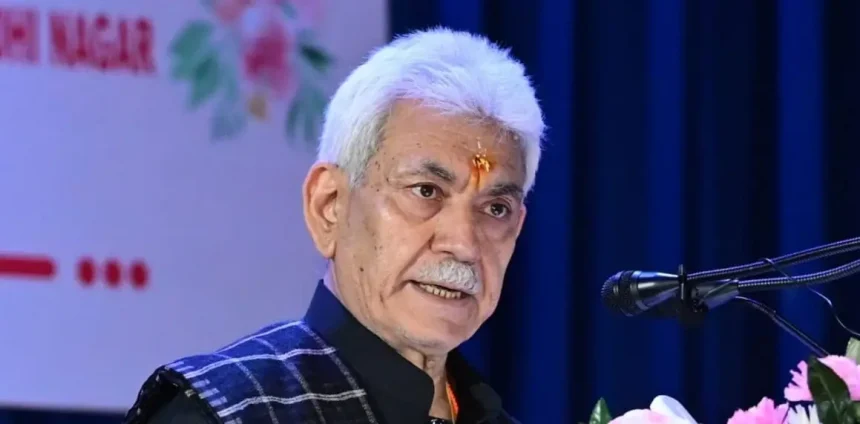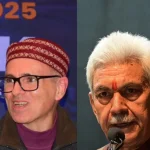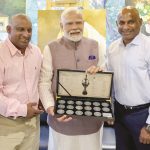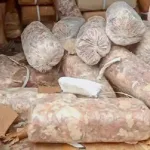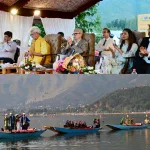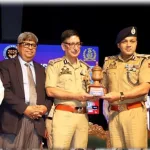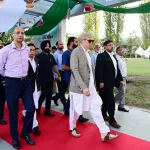JAMMU, APR 05: Lieutenant Governor Manoj Sinha, in an interview with National news channel, shared his vision for the future of the Union Territory, as well as addressing the concerns surrounding its political stability, security situation, and economic growth post the abrogation of Article 370.
During the interview, Sinha reflected on the historical challenges faced by Jammu and Kashmir, particularly with separatism, corruption, and terrorism. He also discussed the region’s ongoing transformation and how the central government’s strong oversight has brought about significant change.
Asked about restoring full statehood to the Union Territory, Sinha expressed confidence in the region’s progress, emphasising that the area had already moved beyond its troubled past.
“I believe Jammu and Kashmir has moved far ahead from that point. The water in the Jhelum has flowed much more than before. The current government has a very strong willpower, especially with Home Minister Amit Shah, who keeps a close eye on all these issues. I do not foresee any possibility of separatism making a comeback,” said Sinha.
On the issue of separatism, which has long been a focal point of concern in Jammu and Kashmir, Sinha said understanding the DNA of the Jamaat and Hurriyat is a bit challenging. But based on the evidence, action has been taken against them consistently, and this evaluation continues at all levels.
“Earlier, organisations would be banned, but individuals would not be directly targeted. They would just form new organisations and continue their activities. Now, the Ministry of Home Affairs does not just ban organisations, but also targets individuals. If someone like Manoj Sinha is banned, the organisation they form will automatically be on the radar of security agencies,” he said, expressing confidence that separatist movements were now history, highlighting that “no party or organisation is now supporting separatism.”
“The Home Ministry is watching all this with great vigilance. There is no room for such activities. There is no possibility of separatism rearing its head again under the current administration.,” he emphasised.
He highlighted the dismantling of key separatist organisations such as Hurriyat and Jamaat. “These organisations were deeply embedded in the region’s political DNA, but today, their influence has significantly waned. Many of their affiliated groups have parted ways and the central government is actively working to prevent any resurgence,” he said.
Addressing the issue of Overground Workers (OGWs), Sinha spoke about the actions taken to remove such elements from government departments and educational institutions. He explained that while the demand for full statehood has resurfaced, the government has been vigilant in identifying and acting against those who support terrorism and separatism. “The action is continuous, and it has to happen at every level to prevent anyone who could be involved in treason or anti-state activities,” he affirmed.
Sinha also addressed the rising concern regarding terrorist activities in Jammu, particularly the growing infiltration and violence in the region over the past year and a half. He attributed the initial focus of security efforts to Kashmir, where terrorist activities had been more concentrated for years.
“Jammu had been peaceful for over 15 years, which naturally led to a focus on Kashmir. But in the last two-and-a-half years, efforts in Jammu have been ramped up significantly,” Sinha said. He noted that forces like the Assam Rifles, CAPF, and the Jammu & Kashmir Police had been deployed extensively to prevent further infiltration and combat terrorism.
He highlighted that the general public of Jammu, who are largely opposed to terrorism, will play a key role in helping bring back normalcy to the region. “The people of Jammu have always rejected terrorism, and this public sentiment is a huge advantage in our fight against terror,” Sinha added.
Responding to concerns about corruption in Jammu and Kashmir’s political landscape, particularly the infamous Roshni scam, Sinha said that during his tenure, he has taken firm action against the misuse of power by corrupt officials. “Corruption has been in the DNA of Jammu and Kashmir’s administration, but strong actions were taken under my leadership,” he remarked, acknowledging the historic mismanagement in land deals and irregularities that allowed illegal settlements. He pointed out that these actions, including the annulment of certain land deals, were part of a larger strategy to cleanse the system.
He continued, “When the issue of corruption and land misuse was raised, actions were taken not just against the system, but also against individuals who were directly supporting terrorism. It was not just about tackling corruption but ensuring no one in the system could commit treason or subversive activities.”
On the issue of Pakistan-Occupied Kashmir (POK), given the ongoing agitation in the region over Pakistan’s neglect of infrastructure and the deteriorating condition of the state, LG Sinha acknowledged the growing discontent among residents of POK, noting that Pakistan’s struggle as a state, particularly in the wake of internal strife and neglect, has led to rising dissatisfaction among the population.
While he refrained from commenting directly on the government’s stance regarding the reclaiming of POK, he reaffirmed that such matters were within the purview of the Government of India. “This is a decision that only the Government of India can comment on. I am fully aware of my limits regarding this issue,” he stated, stressing that his role is to focus on governance, development, and peace within Jammu and Kashmir.
On the economic front, Sinha highlighted the growing significance of religious tourism in Jammu and Kashmir, especially the success of the Mata Vaishno Devi and Shri Amarnathji pilgrimages. He pointed out that the number of pilgrims visiting these holy sites had reached unprecedented heights, contributing significantly to the region’s economy. “The pilgrimage sector is not just about religion; it’s about economic development too. The people of Jammu and Kashmir are deeply involved in supporting this cause,” Sinha remarked.
Sinha proudly shared that significant strides have been made in road construction, ensuring a more comfortable journey for pilgrims. “At an altitude of 13,500 feet stands Baba Barfani, and there used to be a 6-feet wide road. I am pleased to tell you today that a 12-feet wide road has been constructed from both Baltal and Nunwan routes,” he said, emphasizing the improvements made in the infrastructure over recent years.
Previously, the arduous journey to the shrine posed considerable challenges due to the narrow roads, but the expansion of these routes, coupled with the addition of grid power from Baltal, has greatly alleviated difficulties. “Material is now reaching there by trucks, and hospitals with 200-100 beds have been set up in Baltal and Panjtarni to support the pilgrims,” Sinha explained. These initiatives are part of a larger effort to make the pilgrimage smoother and safer, providing better medical facilities and infrastructure.
Regarding Vaishno Devi, Sinha said the number of pilgrims has reached 9.6 million, adding “I expect it to cross 10 million soon. There are also projects like the ropeway, which will make pilgrimages more accessible, especially for the elderly and differently-abled. Local communities have been cooperative, and we’re ensuring that the development doesn’t affect anyone’s livelihood.
“The facilities have been significantly upgraded, and we’re working to ensure that the infrastructure meets the growing demands,” he said.
He said ropeway projects are aimed at making pilgrimages more accessible, especially for the elderly and differently-abled. “Local communities have been cooperative, and we’re ensuring that the development doesn’t affect anyone’s livelihood,” he assured, adding that no one would lose their employment as a result of these projects.
While there was some initial opposition from the local community, the work was temporarily halted. To resolve this, a committee has been formed with Ashok Bhan Ji and Suresh Sharma Ji as members, along with the Divisional Commissioner. Discussions with the local people are ongoing.
“I want to reassure everyone that no one’s employment will be affected. The project will cater especially to the elderly and disabled people, making it easier for them to travel. The board will ensure that no one’s livelihood is impacted, and if anyone does face any negative impact, we will compensate them accordingly,” he added.
Sinha stressed that restoring trust among the local population was key to the region’s success in fighting terrorism and separatism. He cited the growing participation in national celebrations as a clear indication of the changing political and social climate in the valley. “When Article 370 was abrogated, some political leaders predicted that no one would wave the Indian flag in Jammu and Kashmir. Today, not only the tricolour is being waved, but the participation has been overwhelming,” he said, reflecting on the Republic Day and Independence Day celebrations in places like Dal Lake and Pulwama.
When asked about his own security during his extensive travels across Jammu and Kashmir, Sinha acknowledged the challenges but made light of the situation with his characteristic humor. “I’ve traveled to areas that others may hesitate to go to. But the people’s trust in the system is the most important thing. The security forces have been doing an excellent job in ensuring safety for everyone,” he said.
He recalled several instances where the Indian Army and Jammu and Kashmir Police acted swiftly to restore justice when innocent lives were affected by terror. “The people know that if anything wrong happens, the forces will take swift action. That is a big reason for the growing trust among the locals,” Sinha added.
The Lieutenant Governor praised the security forces for their relentless efforts in protecting the people and ensuring justice. He recalled his visit to Shopian , where he was deeply moved by the tragic loss of three Gujjar boys. “I want to praise the police and army for their prompt action. Our focus is on ensuring that no innocent is punished and that the guilty are held accountable,” he asserted.
On a more personal note, Sinha spoke about his commitment to both religious and social causes. “The development of the sacred places is not just about improving infrastructure, but also about fostering a sense of peace and unity,” he concluded.
As Jammu and Kashmir continues its journey toward peace and prosperity, Sinha remains optimistic about the region’s future. “The change is evident. We are moving towards a future where the people of Jammu and Kashmir are stakeholders in their own peace and progress,” he concluded.


